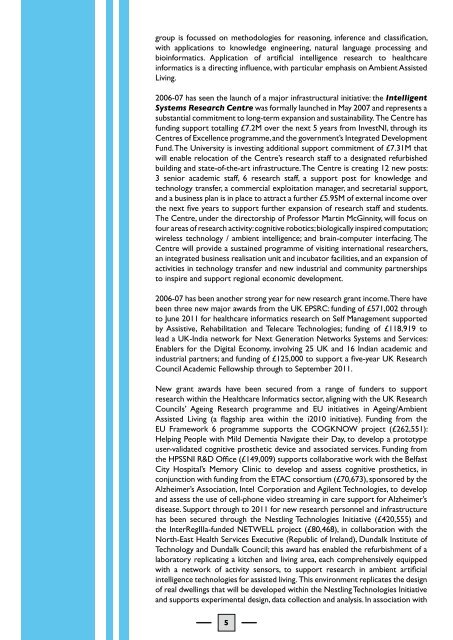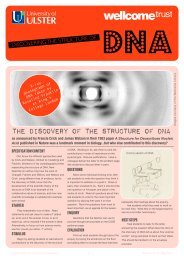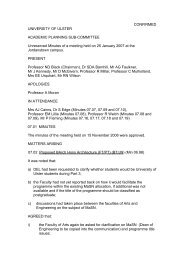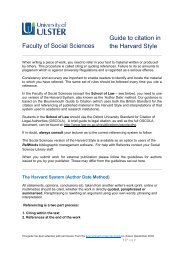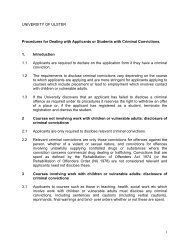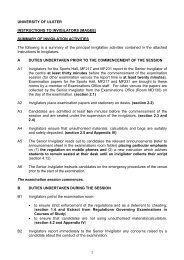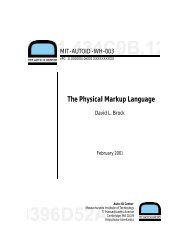computer science research institute - Research - University of Ulster
computer science research institute - Research - University of Ulster
computer science research institute - Research - University of Ulster
You also want an ePaper? Increase the reach of your titles
YUMPU automatically turns print PDFs into web optimized ePapers that Google loves.
group is focussed on methodologies for reasoning, inference and classification,<br />
with applications to knowledge engineering, natural language processing and<br />
bioinformatics. Application <strong>of</strong> artificial intelligence <strong>research</strong> to healthcare<br />
informatics is a directing influence, with particular emphasis on Ambient Assisted<br />
Living.<br />
2006-07 has seen the launch <strong>of</strong> a major infrastructural initiative: the Intelligent<br />
Systems <strong>Research</strong> Centre was formally launched in May 2007 and represents a<br />
substantial commitment to long-term expansion and sustainability. The Centre has<br />
funding support totalling £7.2M over the next 5 years from InvestNI, through its<br />
Centres <strong>of</strong> Excellence programme, and the government’s Integrated Development<br />
Fund. The <strong>University</strong> is investing additional support commitment <strong>of</strong> £7.31M that<br />
will enable relocation <strong>of</strong> the Centre’s <strong>research</strong> staff to a designated refurbished<br />
building and state-<strong>of</strong>-the-art infrastructure. The Centre is creating 12 new posts:<br />
3 senior academic staff, 6 <strong>research</strong> staff, a support post for knowledge and<br />
technology transfer, a commercial exploitation manager, and secretarial support,<br />
and a business plan is in place to attract a further £5.95M <strong>of</strong> external income over<br />
the next five years to support further expansion <strong>of</strong> <strong>research</strong> staff and students.<br />
The Centre, under the directorship <strong>of</strong> Pr<strong>of</strong>essor Martin McGinnity, will focus on<br />
four areas <strong>of</strong> <strong>research</strong> activity: cognitive robotics; biologically inspired computation;<br />
wireless technology / ambient intelligence; and brain-<strong>computer</strong> interfacing. The<br />
Centre will provide a sustained programme <strong>of</strong> visiting international <strong>research</strong>ers,<br />
an integrated business realisation unit and incubator facilities, and an expansion <strong>of</strong><br />
activities in technology transfer and new industrial and community partnerships<br />
to inspire and support regional economic development.<br />
2006-07 has been another strong year for new <strong>research</strong> grant income. There have<br />
been three new major awards from the UK EPSRC: funding <strong>of</strong> £571,002 through<br />
to June 2011 for healthcare informatics <strong>research</strong> on Self Management supported<br />
by Assistive, Rehabilitation and Telecare Technologies; funding <strong>of</strong> £118,919 to<br />
lead a UK-India network for Next Generation Networks Systems and Services:<br />
Enablers for the Digital Economy, involving 25 UK and 16 Indian academic and<br />
industrial partners; and funding <strong>of</strong> £125,000 to support a five-year UK <strong>Research</strong><br />
Council Academic Fellowship through to September 2011.<br />
New grant awards have been secured from a range <strong>of</strong> funders to support<br />
<strong>research</strong> within the Healthcare Informatics sector, aligning with the UK <strong>Research</strong><br />
Councils’ Ageing <strong>Research</strong> programme and EU initiatives in Ageing/Ambient<br />
Assisted Living (a flagship area within the i2010 initiative). Funding from the<br />
EU Framework 6 programme supports the COGKNOW project (£262,551):<br />
Helping People with Mild Dementia Navigate their Day, to develop a prototype<br />
user-validated cognitive prosthetic device and associated services. Funding from<br />
the HPSSNI R&D Office (£149,009) supports collaborative work with the Belfast<br />
City Hospital’s Memory Clinic to develop and assess cognitive prosthetics, in<br />
conjunction with funding from the ETAC consortium (£70,673), sponsored by the<br />
Alzheimer’s Association, Intel Corporation and Agilent Technologies, to develop<br />
and assess the use <strong>of</strong> cell-phone video streaming in care support for Alzheimer’s<br />
disease. Support through to 2011 for new <strong>research</strong> personnel and infrastructure<br />
has been secured through the Nestling Technologies Initiative (£420,555) and<br />
the InterRegIIIa-funded NETWELL project (£80,468), in collaboration with the<br />
North-East Health Services Executive (Republic <strong>of</strong> Ireland), Dundalk Institute <strong>of</strong><br />
Technology and Dundalk Council; this award has enabled the refurbishment <strong>of</strong> a<br />
laboratory replicating a kitchen and living area, each comprehensively equipped<br />
with a network <strong>of</strong> activity sensors, to support <strong>research</strong> in ambient artificial<br />
intelligence technologies for assisted living. This environment replicates the design<br />
<strong>of</strong> real dwellings that will be developed within the Nestling Technologies Initiative<br />
and supports experimental design, data collection and analysis. In association with<br />
5


